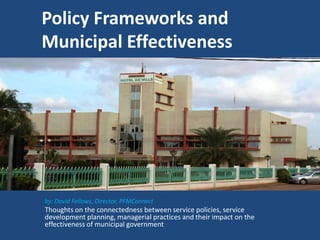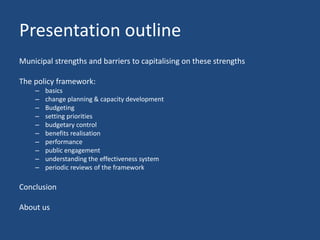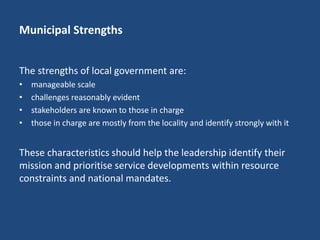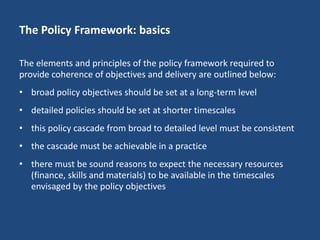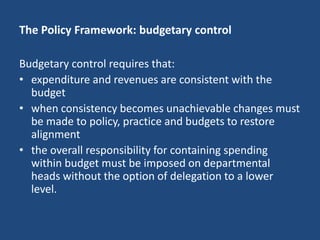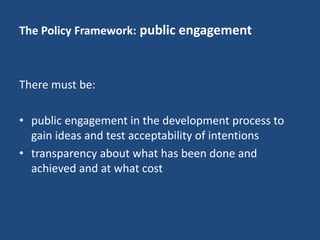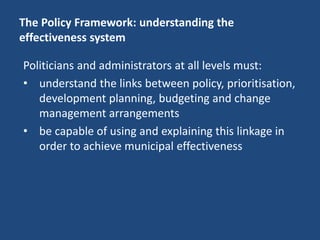Policy frameworks and municipal effectiveness
- 1. Policy Frameworks and Municipal Effectiveness by: David Fellows, Director, PFMConnect Thoughts on the connectedness between service policies, service development planning, managerial practices and their impact on the effectiveness of municipal government
- 2. Presentation outline Municipal strengths and barriers to capitalising on these strengths The policy framework: – basics – change planning & capacity development – Budgeting – setting priorities – budgetary control – benefits realisation – performance – public engagement – understanding the effectiveness system – periodic reviews of the framework Conclusion About us
- 3. Municipal Strengths The strengths of local government are: • manageable scale • challenges reasonably evident • stakeholders are known to those in charge • those in charge are mostly from the locality and identify strongly with it These characteristics should help the leadership identify their mission and prioritise service developments within resource constraints and national mandates.
- 4. Barriers to capitalising on these strengths Municipal strategic policy agendas are often asserted without : • sufficient regard to their consistent articulation • internal coherence • supporting administrative sub-structure. Without these attributes municipal leadership can easily lack: • clarity of direction • delivery competence • support from community and media
- 5. The Policy Framework: basics The elements and principles of the policy framework required to provide coherence of objectives and delivery are outlined below: • broad policy objectives should be set at a long-term level • detailed policies should be set at shorter timescales • this policy cascade from broad to detailed level must be consistent • the cascade must be achievable in a practice • there must be sound reasons to expect the necessary resources (finance, skills and materials) to be available in the timescales envisaged by the policy objectives
- 6. The Policy Framework: change planning & capacity development Operational changes must be supported by: • realistic planning for change implimentation (physical and administrative) • staff training for new administrative arrangements • personnel capacity development to support new delivery requirements • collaboration with like-minded municipalities and external expertise as necessary
- 7. The Policy Framework: budgeting There should be a medium term budget that: • reflects the policy framework over a minimum 3 year timescale • all budgets should contain both revenue and capital provision that should be consistent between the two • budgets must be realistically achievable • where policies are changed the budget must change too
- 8. The Policy Framework: setting priorities No project commitment must be made unless: • budget provision has been allocated as a priority above all competing demands for the available funds
- 9. The Policy Framework: budgetary control Budgetary control requires that: • expenditure and revenues are consistent with the budget • when consistency becomes unachievable changes must be made to policy, practice and budgets to restore alignment • the overall responsibility for containing spending within budget must be imposed on departmental heads without the option of delegation to a lower level.
- 10. The Policy Framework: benefits realisation Success can be supported by: • benefits realisation strategies designed to focus on the pathway to delivering intended outcomes • risk management strategies that anticipate and mitigate possible challenges
- 11. The Policy Framework: performance Civil servants must have performance contracts for achieving service outputs and outcomes within budget
- 12. The Policy Framework: public engagement There must be: • public engagement in the development process to gain ideas and test acceptability of intentions • transparency about what has been done and achieved and at what cost
- 13. The Policy Framework: understanding the effectiveness system Politicians and administrators at all levels must: • understand the links between policy, prioritisation, development planning, budgeting and change management arrangements • be capable of using and explaining this linkage in order to achieve municipal effectiveness
- 14. Review Periodic reviews of the policy framework: • offer an opportunity to improve its coherence and effectiveness • can identify critical areas of weakness in municipal capacity that must be addressed if ambitions are to be realised. • may be developed through a series of workshops with key stakeholders and circulated for comment prior to finalisation
- 15. Conclusion Municipalities are well placed to make crucial contributions to community well-being and development. Better governance based on coherent policy frameworks can help municipalities deliver on their potential. In the author’s view development partners can be too keen to rush developing countries into adopting practices that are unsustainable before the necessary organisational capacity has been achieved.
- 16. About us David Fellows began his career in UK local government where he became President of the Society of Municipal Treasurers and a pioneer of digital government, he followed this with stints in the UK Cabinet Office and the National Treasury of South Africa. He is a director of PFMConnect. PFMConnect is a consultancy specialising in the provision of public financial management services The article on which this is based can be found at: http://blog-pfmconnect.com/policy-frameworks-and-municipal-effectiveness

